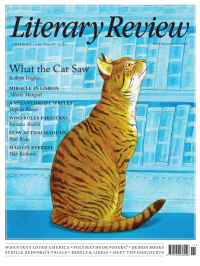John Phipps
A Matter of a Record
Xstabeth
By David Keenan
White Rabbit 176pp £14.99
The reader’s first suspicion that all is not as it seems in Xstabeth, the enigmatic new novel by David Keenan, comes when its author dies in the novel’s preface. Keenan, we learn, was a writer and local historian who ran a correspondence course on the occult and ‘committed suicide by throwing himself from the top of the tower of St Rule’.
Xstabeth, we’re told, is the self-published novel this fictional Keenan left behind, along with a series of other works such as ‘“The Heyday of Craigtoun Park”, a lament; “Octogenarian Golfer Recalls Old St Andrews”, a lament; and “The Dutch Village”, sadly, a lament’. Xstabeth is not a lament but something altogether stranger. At its centre is a story narrated in the first person by a teenage Russian girl growing up in St Petersburg in Brezhnev’s time. Her father is a musician, and she begins an affair with his friend, a ‘famouser musician’. She recounts the relationship in bursts of telegraphese. These brief sentences never lead where you expect:
He compared me to certain months. To the beauty of a wild mountain. I thought all mountains were wild. I thought that was normal. No. He said. Some mountains cannot be tamed. But most of them in the end can be conquered. It all went to my head. As you can imagine.
‘I thought that was normal’… Throughout Xstabeth, people act as though extraordinary things are normal. The narrator attends strip clubs with her father, travels to the unlikely destination of St Andrews, has an affair with a famous golfer and at one point sits on a toadstool in a fairy glade. The title refers to the ‘loner folk’ music the narrator’s father plays one night in a bar, which the barman feels compelled to record. ‘He said the music was making demands of him … Like it was a prison warden in a gulag. Or a member of the secret police … Then it told him its name. It said its name was Xstabeth.’
Interspersed with this narrative are essays by the fictional David Keenan’s followers and acolytes. These have titles like ‘Memory in Xstabeth’ and ‘Grace in Xstabeth’, and feel closer to gnostic texts than parodies of academic writing. ‘Memory in Xstabeth’ begins, ‘If you were able to witness a memory coming into existence – and the technology is here and available right now according to all accounts – then it would appear like a star being born in a far-off galaxy.’
It should be said that in its internationalism, its track-stopping similes, its typographical pictograms (birds are drawn like this: ^.^, ~.~, «.»), its meta-fictional framework, its exaggerated sex scenes and its plot centred around a mysterious piece of art, this book bears the crisp boot print of Roberto Bolaño, less of an influence and more of an inhabiting spirit. While it lacks that author’s dark humour – the constant, malevolent sense that things might be precisely as they seem – laughter is provided in Xstabeth by a brackish straightforwardness that punches through the magical thinking.
If there is a thread connecting the episodic progress of this novel, it seems to be a question of how reality interacts with its representation, especially in art. Though this sounds dull in paraphrase, it feels fresh in the book. ‘Don’t they always say that teeth mean sex,’ remarks the narrator about a dream. ‘Or what. But where does it end. If a symbol reveals a symbol.’ At another moment, her father watches birds on the beach. ‘Everyone who has ever come here thinks they see the same birds every time. In the same places. He said. The same bird is replaced by the same bird.’ The mysterious music that gives the novel its name seems to be unrepeatable: her father, when he tries, can’t remember how to play it. A copy of the record turns up in a shop in St Andrews – except it’s not a copy, because it seems to feature a different voice.
‘The point of art is to be done with it,’ says the narrator’s father at one point. Some will find this book’s intellectual preoccupations irritating and its directionless plot unpersuasive (it’s easy to miss some of Keenan’s careful management). But for all its peculiarity, it is one of the most interesting novels I’ve come across this year. Reading it, I felt the unmistakable pulse of something living, and it isn’t done with me yet.

Sign Up to our newsletter
Receive free articles, highlights from the archive, news, details of prizes, and much more.@Lit_Review
Follow Literary Review on Twitter
Twitter Feed
The son of a notorious con man, John le Carré turned deception into an art form. Does his archive unmask the author or merely prove how well he learned to disappear?
John Phipps explores.
John Phipps - Approach & Seduction
John Phipps: Approach & Seduction - John le Carré: Tradecraft; Tradecraft: Writers on John le Carré by Federico Varese (ed)
literaryreview.co.uk
Few writers have been so eagerly mythologised as Katherine Mansfield. The short, brilliant life, the doomed love affairs, the sickly genius have together blurred the woman behind the work.
Sophie Oliver looks to Mansfield's stories for answers.
Sophie Oliver - Restless Soul
Sophie Oliver: Restless Soul - Katherine Mansfield: A Hidden Life by Gerri Kimber
literaryreview.co.uk
Literary Review is seeking an editorial intern.